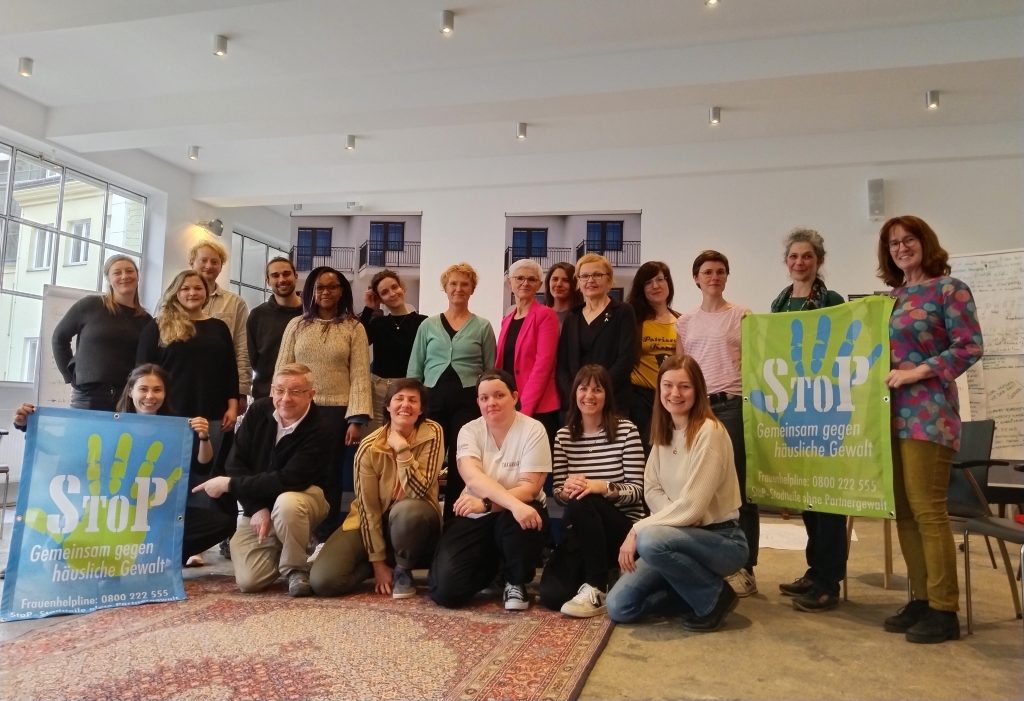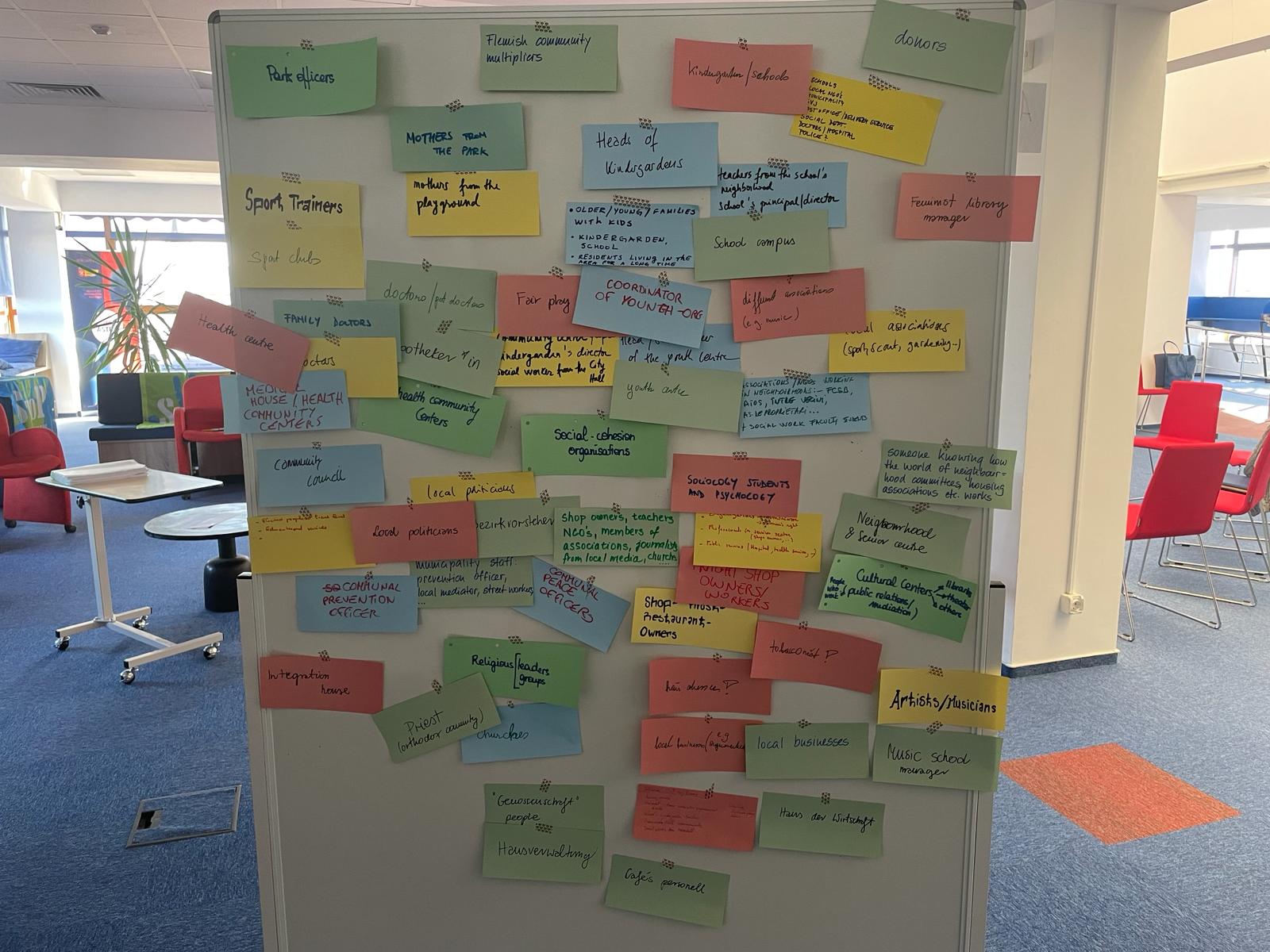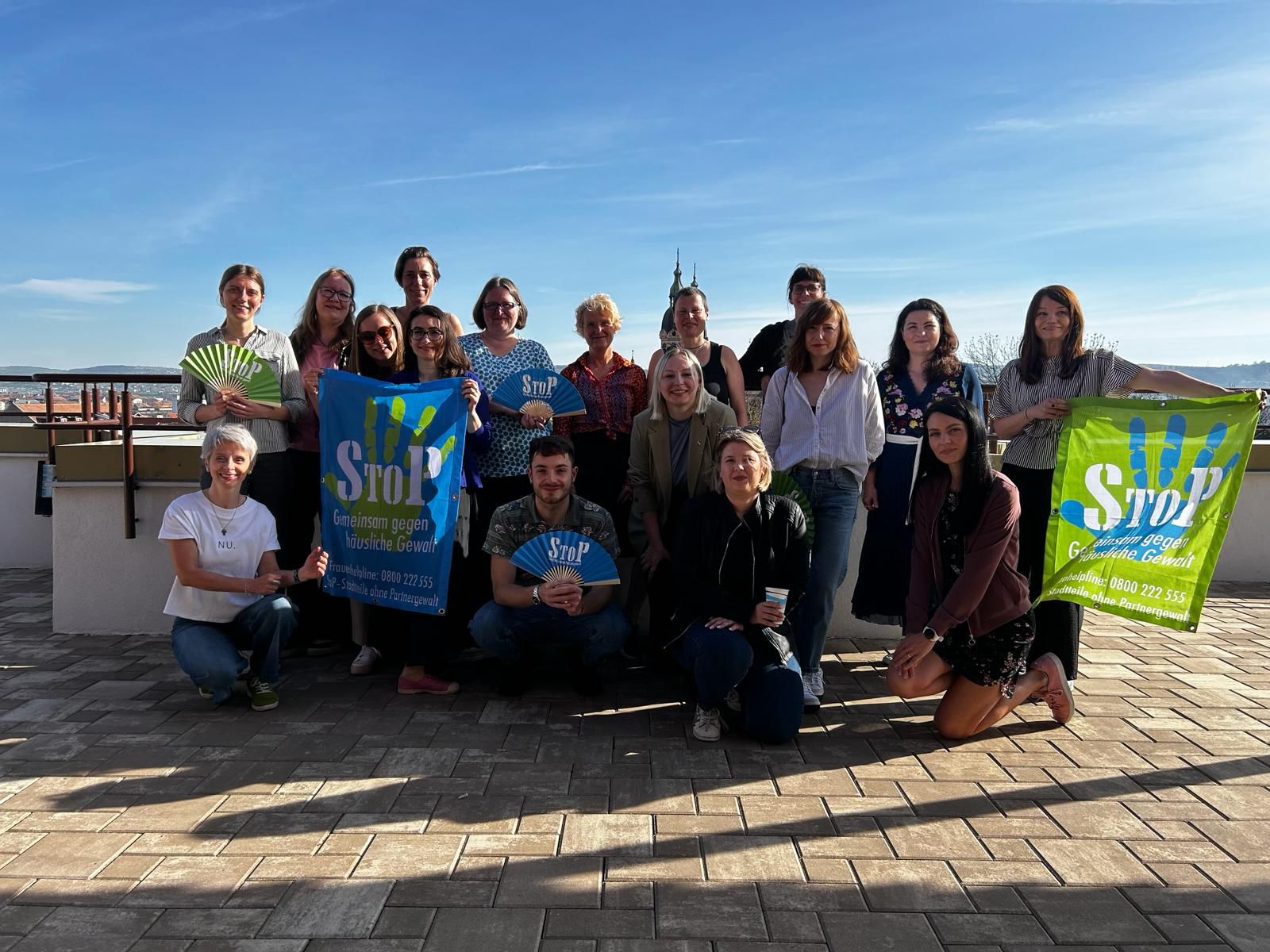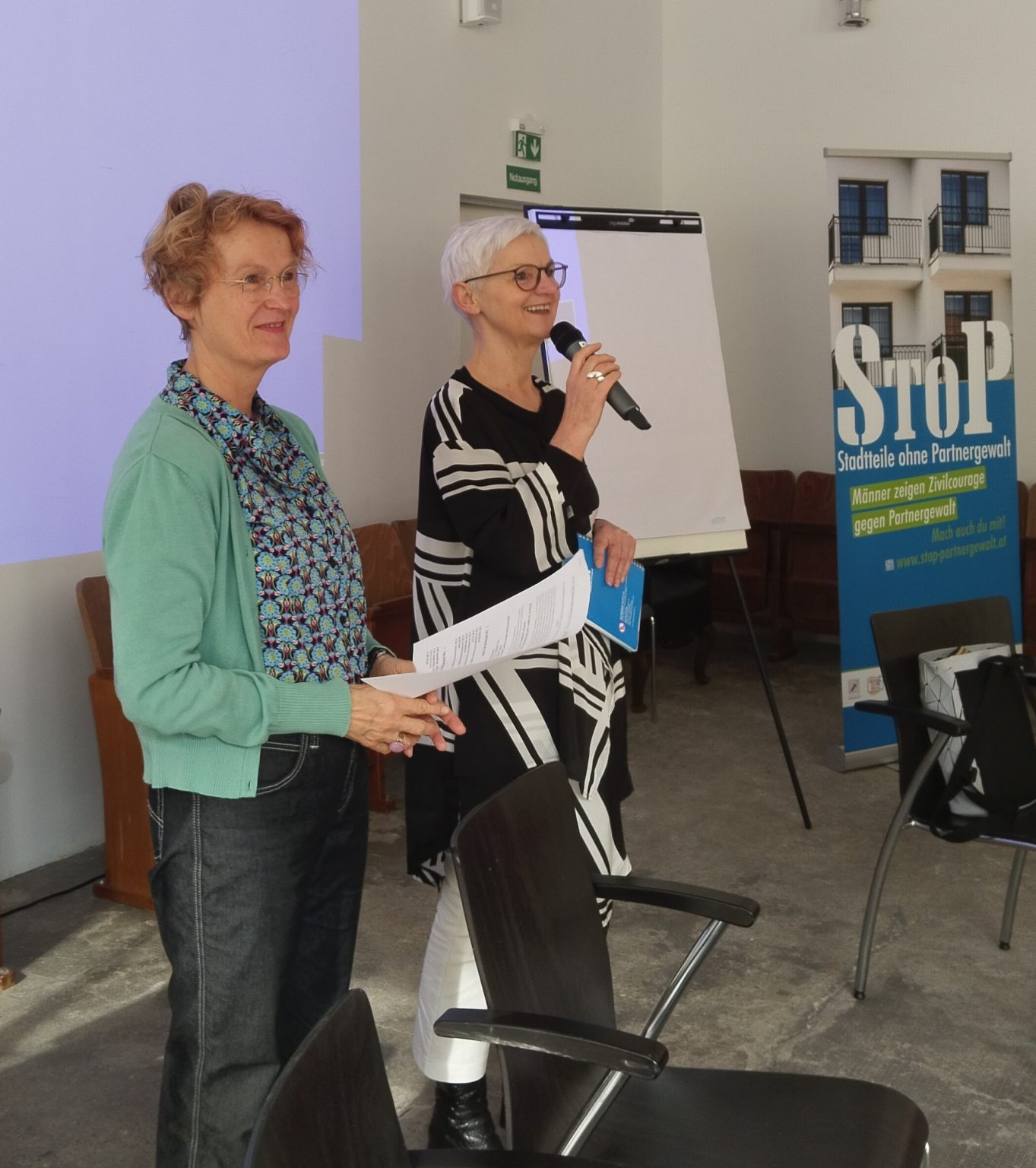Abstract
If you are considering whether StoP work would be suitable for your city or town, you can network with us and contact our partner organisations in Europe. Maybe together we can find ways to start StoP in your area. In Austria and Germany in particular, you will find experienced colleagues with whom you can get in touch. However, you will need local allies and there is no way around fundraising. Let us know if you are interested in a StoP workshop or the training programme. You can find more information here in this section.
Involvement in the StoP network
Stop projects come into being in many different places and in many different ways: committed staff at a youth centre take part in a training course; local politicians want to take comprehensive action against domestic violence in their district and prepare a pilot funding programme; an NGO wants to combine violence prevention and civil society involvement and sets up a network, to name but a few examples. StoP is a concept that has been developed in practice and theory over many years and has fixed components. How to set up a project in concrete terms can be found in 8 Steps – Step 1: Getting started. Committed people from all walks of life are the starting point. It is important to get as many people as possible excited about the project: it is successful, motivating and offers a wide range of opportunities to get involved and support! This includes networking, public relations, fundraising and providing space. However, the foundation of StoP's work is finding and training suitable organisers.
Public relations
StoP's publicity and press work is both central and extensive. It involves a lot: producing and distributing StoP information material (flyers, giveaways, posters, banners, etc.), advertising, organising information desks, information material, sending out press releases, posting on social media.
A dedicated StoP website and its continuous updating are also part of the media and public relations work. There are also StoP kick-off events, which are particularly important at the beginning of a StoP project. Kick-off events can be press conferences combined with information events or small workshops.
All relevant stakeholders can be invited, starting with (local) politicians and the media, and including active neighbours and project partners, local leaders stakeholders and celebrities. In Austria, for example, a press conference was organised and invitations sent out together with the with the Minister of State in charge for each StoP expansion and further financial support or safeguarding. This had and still has a great media impact. The media throughout the country became aware of StoP and wrote numerous articles and features. Interviews with StoP organisers and activists were also conducted on radio and television. It is important to always consider and involve active neighbours in all media appearances and events (see resource 8.4).
There have also been events with the Head of State, both in Austria and in Germany, where active neighbours were always present and played an important role. Network meetings and events are also part of public relations. The more they are publicised, the more people will become aware of StoP and the issue of violence against women.
Fundraising
In order for the StoP community work to be established and grow in a particular place or district, financial resources are needed, a basic security or planning security. This in turn requires a fundraising concept with a number of considerations. Fundraising covers many areas: Donations, various subsidies, sponsoring, crowdfunding, etc. All Stop Organisations and Stop Organisers should have some basic knowledge of fundraising. Participating in awards or other project submissions is also part of fundraising and publicity.
Anyone can start StoP. The first steps are to build a network, use the arguments in this toolbox, contact StoP, network partners organisations in different European countries, preferably in Germany or Austria, exchange ideas and seek advice, and find people and resources to participate in a StoP-training program.
Take your time and listen carefully why the launch of the StoP project is important for our project partners in the European Union! It is about the decrease of presssure on professionals with a community-based solution method, to mobilise neighbourhoods and to highlight that prevention is not only a women's issue!
StoP-EU Network: StoP - Community Matters!
The EU project “StoP – Community Matters!” was an important milestone in the development and dissemination of StoP. It was funded by the EU Commission from 2023 to 2025. This gave StoP a new dimension and enabled it to be developed further at European level, together with other project partner organisations from several countries. StoP has thus become even more international in character and significance. This project has helped to further develop important building blocks of StoP community work and to establish them at the European level. Together with the project team, a StoP Toolbox and a StoP Curriculum were developed for international use and extension to the European Union. The project prepared the ground and trained local stakeholder as StoP organisers, with the aim of implementing StoP in selected EU partner countries in the future, like the way it is implemented in Germany and Austria. The StoP concept was developed in Germany, first implemented 2010 and extended to Austria in 2019. The long-term goal is to replicate StoP throughout Europe.
The following project partners are part of the EU project:
HAW, Department Social Work, Hamburg University of Applied Sciences, Germany
HAW, Centre for design research, Hamburg University of Applied Sciences, Germany
AÖF, Association of Austrian Autonomous Women’s Shelters, Austria
ALEG, Association for Liberty and Equality of Gender, Romania
ROSA Centrum Pro Zeny ZS, Czech Republic
PSYTEL, France
Garance ASBL, Belgium
WAVE, Women Against Violence Europe, Austria
WWP EN, the European Network for the Work with Perpetrators of Domestic Violence, Germany
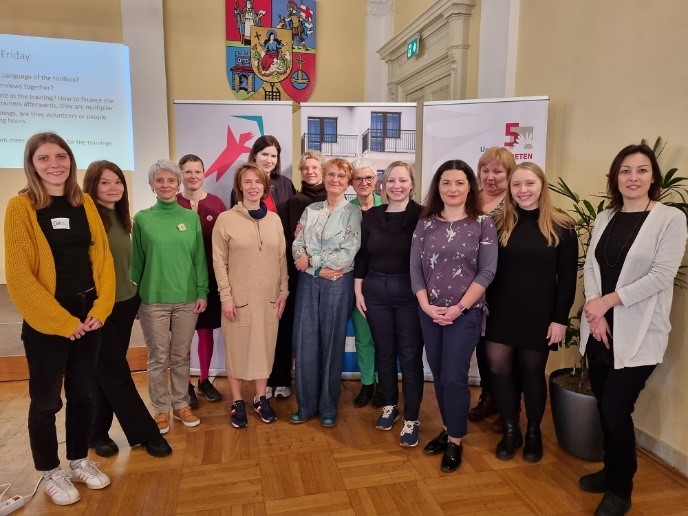
How to start new StoP project
First of all, you need initiators in the community, e.g. an organisation that can provide the human and financial resources for StoP community work, at least for two to three years for the initial phase, and there should be an idea of how to move forward after this initial phase to consolidate and expand activities, see Step 1.
StoP Training and Training Programme
Qualified training is the foundation of StoP. The completion of the four training modules is the most important and sustainable step before implementation and for a well-founded and sustainable establishment of the StoP concept with the 8 action steps in the respective StoP communities. We hope to be able to offer training in languages other than German (or English) in the future. If you are interested, please let us know at Sabine.stoevesand@haw-hamburg.de
StoP: a community-based model to stop intimate partner violence/domestic violence
Violence against women in the home and in close relationships is widespread in all European countries. Much has been achieved in recent decades, but the numbers of femicides, verbal, sexual and physical assaults are still high and aren't decreasing.
The StoP model is designed to fill a significant gap in the prevention and response to gender-based violence. StoP works with the resources of local communities and is a transformative approach to creating social change; StoP is about civil society engagement; it aims to educate and mobilise local communities to stop this violence. StoP builds on the fact that domestic violence is perpetuated by social norms, power relations and the concrete behaviour of the social environment of those affected by and perpetrators of violence. People close to victims and perpetrators often know about the situation, neighbours hear something, see something. StoP encourages and educates them to say and do something to prevent domestic violence, support victims and bring about change. The key is well-trained staff – the StoP organisers.
Target groups
Practitioners from organisations, institutions and feminist NGOs working on gender and social justice, neighbourhood organisations, community centres, women's refuges and women's shelters, whose work fits the StoP approach and could be integrated there in the medium or long term.
Graduation
Upon successful completion of the training, participants will be certified as “StoP Coordinators for Community-Based Prevention of Domestic and Gender-Based Violence”. Graduates are licensed to implement and manage the StoP programme in new communities.
Requirements of partcipation
- Higher education and some substantial practical experience (exceptions could be arranged).
- The language of the training is English or German. It doesn't have to be at a high level, but good enough to understand the training content. Other languages may be added depending on staffing and funding.
Requirements for completion/licensing
Attendance for the full 12 days of training, completion of assigned coursework and participation in intervision groups (at least 6 hours in total). These assignments form the basis of the final interview/colloquium.
Objectives
- Trained StoP organisers: are familiar with the district/local community and have detailed knowledge of living conditions, social structures, key people and power relations.
- are able to use the existing networks and structures of the community to introduce StoP raise awareness that intimate partner and domestic violence is not a private matter, raise awareness of the causes and mechanisms of domestic violence and how it relates to gender roles and traditions.
- initiate and facilitate neighbourhood groups, neighbourhood discussions and workshops, and train neighbours and local leaders in preventive and supportive action.
In order to impart the appropriate skills, the training focuses on the following competence levels: cognitive knowledge (content), self-reflection (own attitudes) and instrumental knowledge (methods).
Professional and conceptual framework: community work/community organising
Community work is a traditional concept of social work and has been around for more than a hundred years. Its basic principles include participation, relationship building and collective empowerment, community education and mobilisation, linking personal experiences with social structures and conditions, creating community cooperation and networks to transform unjust power relations.
Basic characteristics of the training
StoP training is about gender-based violence prevention, grassroots work, social change and community accountability. It incorporates and celebrates trainees' existing expertise and combines this with the acquisition of new knowledge and skills.
Content of Modules
Modul 1
Basics: StoP model, domestic violence and community work
(3 days)
Introduction to the basics of the StoP concept and the main problem that StoP work deals with: domestic violence, defined as violence between adults, in a close social relationship, and in its severe, multiple forms, widely and predominantly affecting women. Woman is understood as the sex assigned at birth or self-defined. The work of StoP is based on the “recognition that the realisation of legal and de facto equality between women and men is an essential element in the prevention of violence against women” (preamble of the Istanbul Convention, the Council of Europe Convention on combating violence against women and domestic violence).
Modul 2
Community and Domestic Violence, Community Organising, Diversity Practice Interventions
(3 days)
The second module deepens competence in the field of violence and transformative neighbourhood work. It focuses on mobilising communities and bringing people together around the issue of domestic violence and on techniques for concrete intervention in cases of suspected or actual domestic violence.
Modul 3
StoP work with different target groups
(3 days)
In the third module we will take a closer look at the needs of specific target groups, their empowerment and male allyship.
- Empowering and strengthening children and young people
- Inclusion and empowerment of disabled neighbours and victims
- Men as allies/working with men in the context of StoP
Modul 4
Group work, community education, StoP practice, outlook, closing
(3 days)
The focus is on education and awareness-raising through working with neighbourhood groups and communities, and how to take StoP forward in partner countries. Further information on the StoP project and connections can be found here (automatic translations into many languages are available on all pages).
Links
-
Further information on the StoP project and connections can be found here (automatic translations into many languages are available on all pages):
-
-

